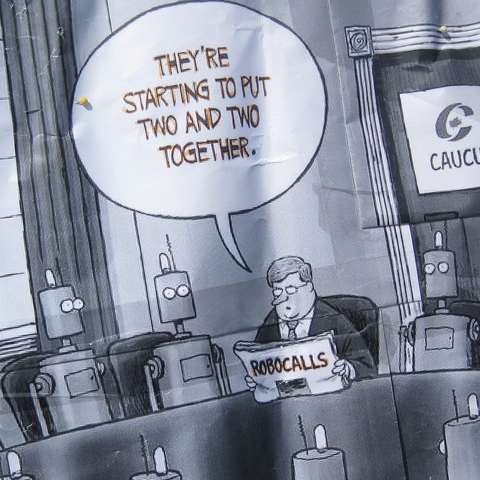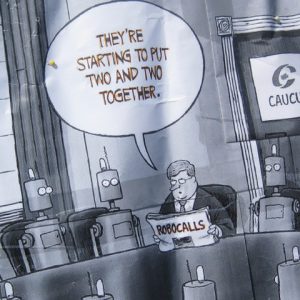
Why voter suppression case isn’t all wrapped up with a nice little bow for the Conservatives
So is the voter suppression case dating back to the 2011 federal election all wrapped up with a nice little bow for the Conservative Party of Canada? On Thursday, former junior party staffer Michael Sona, 25, was convicted of one charge of electoral fraud under the Elections Canada for his part in placing misleading robocalls […]
So is the voter suppression case dating back to the 2011 federal election all wrapped up with a nice little bow for the Conservative Party of Canada?
On Thursday, former junior party staffer Michael Sona, 25, was convicted of one charge of electoral fraud under the Elections Canada for his part in placing misleading robocalls in Guelph riding — directing non-Conservative supporters to bogus polling stations.
But let’s review some things that makes the “Pierre Poutine” case a tad more complicated for the Conservatives.
- In explaining his ruling, Judge Gary Hearn said evidence indicates one or more person was involved beyond Sona.
- According to Elections Canada, whoever orchestrated the illegal calls relied on information from the Conservative Party’s voter-tracking database, known as the Constituent Information Management System. CIMS is “tightly held by the party, with access password protected,” a National Post columnist has explained.
- A source close to the robocalls investigation previously told Postmedia News and the Ottawa Citizen, which led the coverage on the file, said it was unlikely a junior Conservative staffer could have pulled off the scheme on his own. It involved recording a bilingual, professional-sounding message and covering all electronic tracks.
- During the trial, crown witness Andrew Prescott, who served as deputy manager of the Conservative campaign in Guelph (and who was provided immunity in exchange for his evidence), acknowledged he had logged into an account with the company used to send out the calls. “Prescott told the court he was instructed to do so by Ken Morgan, the campaign manager, who supplied him with the password,” explains the Ottawa Citizen in its recap of the case.
- Morgan refused to speak to investigators. Then he moved to Kuwait. “The evidence certainly strongly suggests that Mr. Morgan was involved,” Crown prosecutor Croft Michaelson told the court in closing arguments.” Judge Gary Hearn acknowledged this point on Thursday before rendering his verdict.
- The “sole issue” before the court, though, was whether “Sona is one of the individuals involved, not about any political campaign or party.”
- Jenni Byrne, the party’s 2011 national campaign manager and now deputy chief of staff in the Prime Minister’s Office, instructed a potential key witness in the investigation (Prescott) to push off an interview with an Elections Canada investigator so Byrne could confer with lawyers.
- Elections Canada wasn’t been able to speak to everyone it wanted to as part of its investigation, despite requests for interviews; Elections Act does not grant the agency the power to compel testimony, so it’s hard when people (or a political party) are uncooperative.
- The Conservative government had promised to give this power to Elections Canada before the next election, but failed to do so when it amended the act earlier this year.
- Elections Canada had recommended that the government update this section of the act, but the Conservative government rejected the recommendation, despite this warning from Chief Electoral Officer Marc Mayrand back in March: “The response of Canadians in the face of the robocall affair has been overwhelming. Canadians rightfully expect that such conduct, which threatens the very legitimacy of our democratic institution, be dealt with swiftly and effectively. Without the power to compel testimony, as exists in many provincial regimes, the commissioner’s ability to carry out this investigation will remain limited. All in all, when looking at the proposed changes in relation to enforcement, the bill does not address the most pressing expectations of Canadians for timely and effective investigations.”
- If the Conservative Party conducted an internal investigation to get to the bottom of the robocalls scheme, it has not shared the results with the public.
- In separate civil proceedings in Federal Court backed by the Council of Canadians, a judge upheld the results in six federal ridings in the 2011 election, but did conclude that fraud had occurred in the election beyond Guelph. Here are a few excerpts from the 2013 judgement: “there was an orchestrated effort to suppress votes during the 2011 election campaign by a person with access to the [Conservative Party of Canada] CIMS database”; “I am satisfied that it has been established that misleading calls about the locations of polling stations were made to electors in ridings across the country, including the subject ridings, and that the purpose of those calls was to suppress the votes of electors who had indicated their voting preference in response to earlier voter identification calls”; “I am satisfied … that the most likely source of the information used to make the misleading calls was the CIMS database maintained and controlled by the CPC, accessed for that purpose by a person or persons currently unknown to this Court. … The evidence points to elaborate efforts to conceal the identity of those accessing the database and arranging for the calls to be made”; “I find that the threshold to establish that fraud occurred has been met by the applicants.”
Now watch political pundits Stephen Carter and Ian Capstick discussing the question about Sona-as-scapegoat on CBC’s Power and Politics on Wednesday:
Photo: PeterBlanchard. Used under a Creative Commons BY 2.0 licence.
Our journalism is powered by readers like you.
We’re an award-winning non-profit news organization that covers topics like social and economic inequality, big business and labour, and right-wing extremism.
Help us build so we can bring to light stories that don’t get the attention they deserve from Canada’s big corporate media outlets.
Donate



